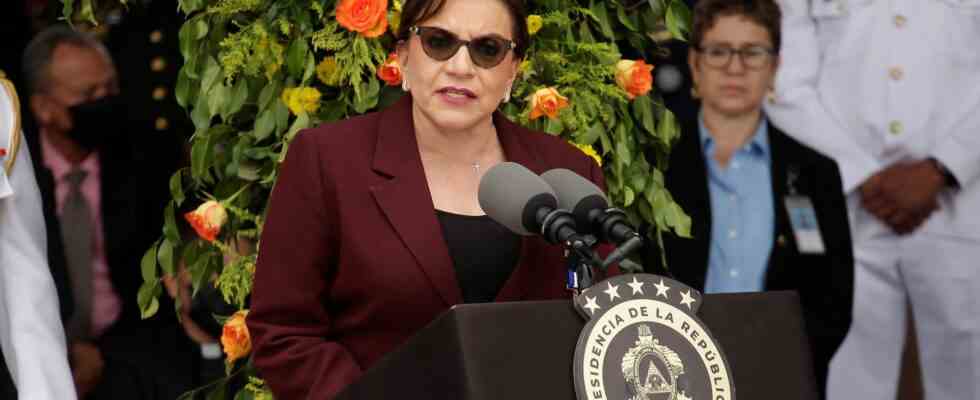Status: 01/27/2023 3:34 p.m
Xiomara Castro has been in office for a year now. In protest, many in Honduras had elected the left-wing politician as president. But their record looks meager.
The expectations of the people in Honduras were high when Xiomara Castro moved into the government palace a year ago – as the first woman and left-wing politician. People cheered her then. A year later, many are disappointed that many of the promises have not been kept.
“Xiomara Castro wanted to get Honduras back on its feet in a year, but there are still many problems: there are no jobs, there is a lack of basic services, health and education,” explains a young Honduran woman.
70 percent live in poverty
For others, like single mother Carmen, at least a little has changed. She works in agriculture in La Esperanza, about a three-hour drive from the capital, Tegucigalpa. The 32-year-old credits the new president with the fact that “she has reduced the price of electricity. We’re not paying incredibly much less now, but at least that’s something for those who don’t have much money.”
Almost 70 percent of the population lives in poverty, over 50 percent of them in extreme poverty. Castro promised a lot: more participation, a government of reconciliation, fighting poverty, corruption and violence.
Heavy inheritance from the predecessor
Castro inherited a difficult legacy a year ago. Your predecessor, Juan Orlando Hernández, is in prison in the US for alleged drug trafficking, but his followers in business and administration still hold important posts. Honduras is one of the most corrupt and dangerous countries in the world.
Human rights and environmental activists continue to risk their lives. In 2021 alone, eleven activists were murdered. And already in the first month of this year three more were apparently killed. They had campaigned against mining projects in a nature reserve and the protection of their rivers.
The brother of one of the murdered Reinaldo Dominguez, for example, accuses the President of slipping away from the situation. “There are countless incidents, something happens here every day. We demand that Castro stop these environmentally harmful mining projects.” Contrary to promises, environmentalists would continue to be criminalized, and the perpetrators would not be caught.
State of emergency against gang crime
Gang violence and extortion characterize everyday life in Honduras. It was a dominant issue in the election campaign. However, Castro had no great success in fighting them, which weakened their popularity ratings. At the end of last year, it responded by imposing a state of emergency over Tegucigalpa and the second largest city, San Pedro Sula, which was extended again at the beginning of the year.
The sociologist and security expert Leticia Salomón considers the measure to be sensible, at least in certain areas. “The violence and the extortion have a direct impact on the lives of the people in the neighborhoods,” she explains. “Many are forced to pay a lot of money. It’s often the small shops that have to pay protection money. And it’s not uncommon for them to then decide to leave the country for the United States or Europe.” From this perspective, the measure of imposing a state of emergency made sense from their point of view.
Danger of arbitrary measures
However, this is not entirely true, Salomón concedes. The police have been given special powers to make arrests. The risk of human rights violations and arbitrary arrests is therefore great, as human rights organizations have also observed in neighboring El Salvador, which has been in a state of emergency for almost a year.
According to the security expert, the police operations must be consistently controlled in order to avoid excesses. Critics also complain that a sustainable strategy is missing. Because as long as the social problems exist, young people would continue to join the gangs to make a quick buck.
Fight against poverty, violence and corruption
To support Honduras in the fight against corruption and impunity, the United Nations and Castro’s government signed an agreement last December for an independent external anti-corruption mission. It is a first step that must now be implemented.
Building effective democratic institutions and fighting poverty, violence and corruption remain a mammoth task for President Castro – even in her second year.
Honduras: One year Xiomara Castro – high expectations, meager record
Anne Demmer, ARD Mexico City, 27.1.2023 2:54 p.m

